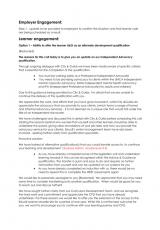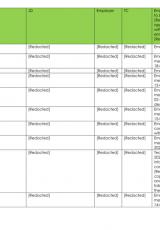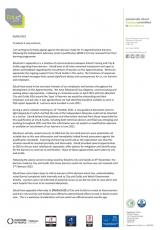Copïau o’r holl ohebiaeth rhwng Llywodraeth Cymru ac Educ8 neu City and Guilds.
Dogfennau

Dog 1 , Saesneg yn unig, math o ffeil: PDF, maint ffeil: 57 KB

Dog 2 , Saesneg yn unig, math o ffeil: PDF, maint ffeil: 145 KB

Dog 3 , Saesneg yn unig, math o ffeil: PDF, maint ffeil: 101 KB

Dog 4 , Saesneg yn unig, math o ffeil: PDF, maint ffeil: 49 KB

Dog 5 , Saesneg yn unig, math o ffeil: PDF, maint ffeil: 476 KB

Dog 6 , Saesneg yn unig, math o ffeil: PDF, maint ffeil: 253 KB
Manylion
27 April 2022
Dear
Request for Information – ATISN 16213
I wrote to you on 8 April regarding your request for information on Educ8 Training.
Information requested
You asked:
- Copies of all correspondence including letters, emails, minutes of meetings, transcripts of telephone discussions and any other form of communication between you, your staff and any other member of the civil service to both Educ8 and City and Guilds in respect of the ejected learners of the Level 4 Independent Advocacy Diploma that have been affected by these circumstances.
- The global cost to the Welsh Government for the contracts with both Educ8 and City and Guilds for the learners ejected from the course.
- What action is the Welsh Government going to take to retrieve the monies given to both organisations so it is rightly returned to the public purse.
Our response
I can confirm the Welsh Government holds information captured by your request.
For question one, I have attached a copy of all correspondence between Welsh Government officials to both Educ8 and City and Guilds in respect of the ejected learners of the Level 4 Independent Advocacy Diploma. This correspondence has been redacted to protect the identity of individuals mentioned or referenced. I have noted when meetings have occurred however these were not formal meetings where minutes were recorded therefore these are not included. To date no telephone conversations have taken place with regard these matters, all correspondence has occurred either via e-mail or video conferencing.
For question two, please see FOI release 16199.
For question three, the FOI act only gives a right to access recorded information, and this request does not capture any such information. However, whilst this doesn’t constitute a Freedom of Information disclosure I can confirm that officials are in discussions with the provider to initiate the reclaim of said monies in line with their Apprenticeship Contract Agreement.
I have decided that some of the information is exempt from disclosure under section 40(2) of the Freedom of Information Act and is therefore withheld. The reasons for applying these exemptions are set out in full at Annex 1 to this letter.
Next steps
If you are dissatisfied with the Welsh Government’s handling of your request, you can ask for an internal review within 40 working days of the date of this response. Requests for an internal review should be addressed to the Welsh Government’s Freedom of Information Officer at: Information Rights Unit, Welsh Government, Cathays Park, Cardiff, CF10 3NQ or Email: Freedom.ofinformation@gov.wales. Please remember to quote the ATISN reference number above.
You also have the right to complain to the Information Commissioner. The Information Commissioner can be contacted at: Information Commissioner’s Office, Wycliffe House, Water Lane, Wilmslow, Cheshire, SK9 5AF. However, please note that the Commissioner will not normally investigate a complaint until it has been through our own internal review process.
Yours sincerely
Annex 1
Application of exemptions
The Freedom of information Act provides a right for anyone to ask a public authority to make requested information available to the wider public. As the release of requested information is to the world, not just the requester, public authorities need to consider the effects of making the information freely available to everybody. Any personal interest the requester has for accessing the information cannot override those wider considerations.
I have decided to withhold the following information:
- Names and personal details of correspondents.
This Annex sets out the reasons for the engagement of section 40(2) of the Freedom of Information Act and our subsequent consideration of the Public Interest Test.
Section 40 of the Freedom of Information Act sets out an exemption from the right to know if the information requested is personal information protected by the Data Protection Act 1998 (DPA). Personal data is defined in Section 1(1) of the DPA as:
“personal data” means data which relates to a living individual who can be identified from those data; or from those data and other information which is in the possession of, or is likely to come into the possession of, the data controller”.
We have concluded that, in this instance, the names and details of correspondents amounts to third party personal data.
Under Section 40(2) of the FOI Act, personal data is exempt from release if disclosure would breach one of the data protection principles. We consider the principle being most relevant in this instance as being the first.
The first data protection principle.
This states:
Personal data shall be processed fairly and lawfully and, in particular, shall not be processed unless -
(a) at least one of the conditions in Schedule 2 is met, and (b) in the case of sensitive personal data, at least one of the conditions in Schedule 3 is also met.
We consider that the information highlighted falls within the description of personal data as defined by the DPA and that its disclosure would breach the first data protection principle. The first data protection principle has two components:
1 Personal data shall be processed fairly and lawfully and
2. Personal data shall not be processed unless at least one of the conditions in DPA schedule 2 is met
Guidance from the Information Commissioner’s Office (Personal information (section 40 and regulation 13) v 1.4) states:
If disclosure would not be fair, then the information is exempt from disclosure.
This approach was endorsed by the Court of Appeal in the case of Deborah Clark v the Information Commissioner and East Hertfordshire District Council where it was held:
“The first data protection principle entails a consideration of whether it would be fair to disclose the personal data in all the circumstances. The Commissioner determined that it would not be fair to disclose the requested information and thus the first data protection principle would be breached. There was no need in the present case therefore to consider whether any other Schedule 2 condition or conditions could be met because even if such conditions could be established, it would still not be possible to disclose the personal data without breaching the DPA” (paragraph 63).
Our analysis of the ICO’s key considerations in assessing ‘fairness’, as set out in the Guidance, are below
- Whether the information is sensitive personal data and the possible consequences of disclosure on the individual ;
Information being redacted is the personal data of the correspondents, identifying them with the views they express. As the data identifies living individuals and associates them with views expressed, this amounts to sensitive personal data.
- The reasonable expectations of the individual, taking into account: their expectations both at the time the information was collected and at the time of the request; the nature of the information itself; the circumstances in which the information was obtained; whether the information has been or remains in the public domain; and the FOIA principles of transparency and accountability;
Correspondents have a reasonable, but not absolute expectation of privacy when engaging in correspondence. It is not their expectation that correspondence will be routinely published in the public domain.
The Information Commissioner has issued guidance on whether release of names of officials in disclosed emails would be unfair, and thus in breach of the first principle of the DPA. The guidance states:
In assessing whether employees can have a reasonable expectation that their names will not be disclosed, key factors will include their level of seniority and responsibility and whether they have a public facing role where they represent the authority to the outside world.
Where the officials in question are not senior staff, do not have a public facing role and where they are acting entirely in an administrative capacity, I have concluded that they have a reasonable expectation that their names will not be disclosed. It is my view, therefore, that disclosure of their names would breach the first data protection principle, and thus are exempt from release under section 40 of the FOIA.
This also applies to officials from other organisations, and to the reasonable expectation of privacy from members of the public who have written to Welsh Government.
- Whether there is any legitimate interest in the public or the requester having access to the information and the balance between this and the rights and freedoms of the individuals who are the data subjects.
We are supplying the correspondence you have requested under the FOIA, and we believe that this meets your information requirement to have sight of this. There does not appear to be an over-riding legitimate interest in knowing who wrote the correspondence, as the context is that it is communication between Welsh Government and Educ8 and City & Guilds on the matter you raised. While knowing which organisation was responsible for each piece of information is required to understand the context of the communication, we do not believe there is a legitimate interest in knowing precisely which official wrote the letters.
Thus, we believe release of this information would be unfair and so breach the first data protection principle. For that reason, the information is being withheld under section 40(2) of the Freedom of Information Act. This is an absolute exemption and not subject to the public interest tests.
